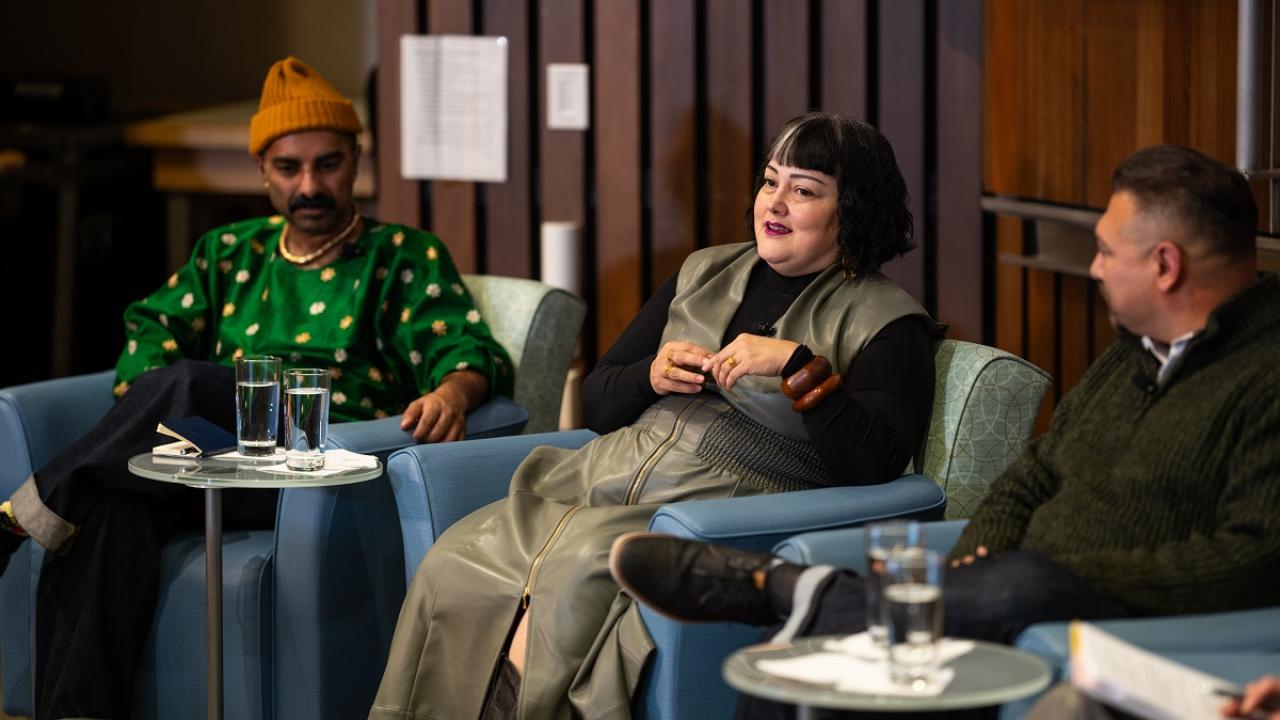
Global Stakes on Local Plates
How to Support a Sustainable Future
Having seasonal fruits and vegetables like avocados and raspberries stocked year-round in your grocery stores seems like an agricultural triumph. However, three world-renowned chefs may disagree. On December 5, 2024, Savor: Open Kitchens inspired audiences, sparked curiosity, and encouraged a new perspective on their next meal. The event showcased how food choices impact traditional cuisines, country economies, and overall food waste in America.
Meet the chefs
Tonight’s SAVOR series headlined Chef Norma Listman Sanchez and Chef Saqib Keval of Mexico City’s Masala y Maiz, known for their feminist, locally driven approach to food, and UC Davis Health Executive Chef Santana Diaz. Chef Sanchez, inspired by family meals and her grandmother’s love of restaurants, works to preserve Mexico’s culinary traditions. Chef Keval uses his love of cooking to fuel activism, challenging kitchen gender norms and creating spaces for social change. Chef Diaz, motivated by the poor quality and unappealing hospital meals, currently improves patient recovery by offering better food options.
Changing the food service industry
Chefs Sanchez and Keval opened Masala y Maiz to address community challenges. Mexico City has high crime rates and is dangerous for women, so it operates from noon to six pm, ensuring staff can travel home safely and have time for their families. For special events that run longer, the restaurant arranges transportation. The restaurant also offers single mothers interest-free microloans and one-on-one business coaching, prioritizing their workers’ well-being over profit.
Chef Diaz focuses on sustainability at UC Davis Health. After improving the taste of hospital food, he shifted his focus to sourcing 70% of ingredients locally and sustainably, making UC Davis Health a leader and a great example in the UC system. His mission to deliver quality food while supporting California farmers and local communities continues today.
Social and economic impact from your grocery basket
A common theme of eating locally grown food ran through the event. Chef Diaz stressed that large institutions can make an impact by sourcing from local farms. High taxes in California make it hard for farmers to compete, forcing them to grow other crops or close their farms. Chef Sanchez highlighted the struggles of Mexican farmers during the Avocado War, where cartels control parts of the supply chain. Farmers face low wages and must pay protection fees, making it difficult to stay in business.
Trendy foods like avocado and quinoa can also harm the countries that produce them. Chef Keval explained that the demand for quinoa in the United States left communities in Peru unable to make their traditional dishes. His advice: eat seasonal foods and shop locally when possible. Keval warned that food waste and imports create a system that decides who gets fed. Changing this system starts with consumers and their choices at the grocery store. To check which foods are in season visit the USDA Seasonal Produce Guide, or purchase from your local farmers market and food co-op.
Additional takeaways
From my perspective, The ‘Open Kitchens’ speaker event stands out as one of SAVOR’s most engaging events, and the content goes far beyond what is included in this article. A large aspect that all three chefs touched on was the cultural significance of food. To fully grasp the content and global stakes that these chefs strive to improve, please watch the full video.
What is SAVOR?
This event is part of the SAVOR series. This series connects the public with UC Davis' research on food and beverages while exploring healthy food systems from a community lens. The 'Open Kitchens' program invites audiences to reimagine food services, food culture, and ethical leadership in food. This series is presented by the Robert Mondavi Institute and the UC Davis Library.

Gwen Gonzalez is a fourth-year food science major passionate about storytelling and food innovation. She is an active member of the Food Tech Club on campus and assists in Guinard's Lab pursuing sensory science. When she's not thinking about food, she immerses herself in music and the performing arts at the Manetti Shrem Museum and Mondavi Center for the Performing Arts. In the future, she hopes to merge her interests in food and the arts and contribute to creative research and development in the food industry.
